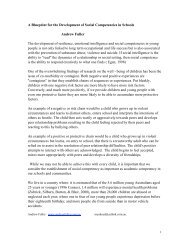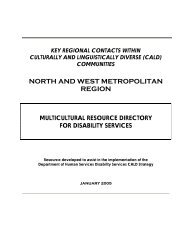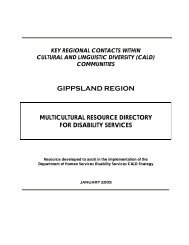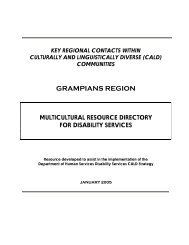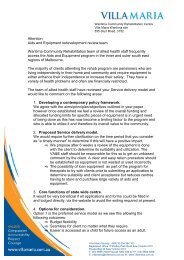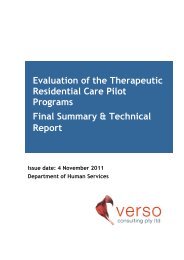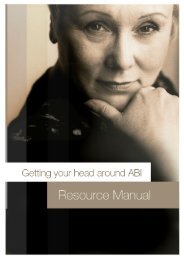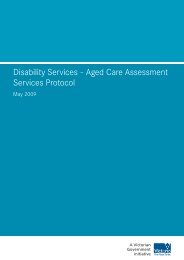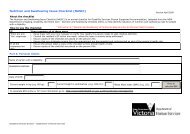Positive Behaviour Support - Department of Human Services - Vic ...
Positive Behaviour Support - Department of Human Services - Vic ...
Positive Behaviour Support - Department of Human Services - Vic ...
Create successful ePaper yourself
Turn your PDF publications into a flip-book with our unique Google optimized e-Paper software.
PowerPoint 13<br />
PowerPoint 14<br />
PowerPoint 15<br />
*<br />
*<br />
*<br />
<strong>Positive</strong> behaviour support: Getting it right from the start - Facilitators reference manual 9<br />
Where does positive behaviour support come from?<br />
The origins <strong>of</strong> positive behaviour support can be found in the movement towards inclusion,<br />
applied behavioural analysis and person-centred values which have as a primary goal enhancing<br />
the quality <strong>of</strong> life <strong>of</strong> a person with a disability.<br />
<strong>Positive</strong> behaviour support is a multi-element approach which provides a clear values base, a<br />
defined process and a sense <strong>of</strong> how to work with a person who displays behaviour/s <strong>of</strong> concern.<br />
It promotes:<br />
• a comprehensive lifestyle change<br />
• a lifespan perspective<br />
• environmental changes<br />
• stakeholder participation<br />
• social validity<br />
• multi-component intervention<br />
• emphasis on prevention.<br />
For positive behaviour support to be successful it requires:<br />
• team work<br />
• seeing the person’s strengths and being committed to the person<br />
• seeing the person and seeing the behaviour<br />
• an appreciation that all behaviours have a purpose<br />
• being positive.<br />
<strong>Positive</strong> behaviour support: Assumptions and possible outcomes<br />
<strong>Positive</strong> behaviour support is based on the assumption that people with a disability require<br />
different levels <strong>of</strong> support as they learn to self-regulate their feelings and behaviour as by nature<br />
they are likely to feel more anxious or stressed than others.<br />
People with a disability can rely on support pr<strong>of</strong>essionals to acknowledge their feelings and the<br />
message communicated via their behaviour. <strong>Support</strong> pr<strong>of</strong>essionals will provide the personal<br />
support and affirmation required and gives specific acknowledgement for behavioural learnings.<br />
<strong>Support</strong> pr<strong>of</strong>essionals support the person with a disability to understand what to do and provide<br />
feedback on what has been done well and leads the person with a disability towards more<br />
appropriate ways <strong>of</strong> interacting



